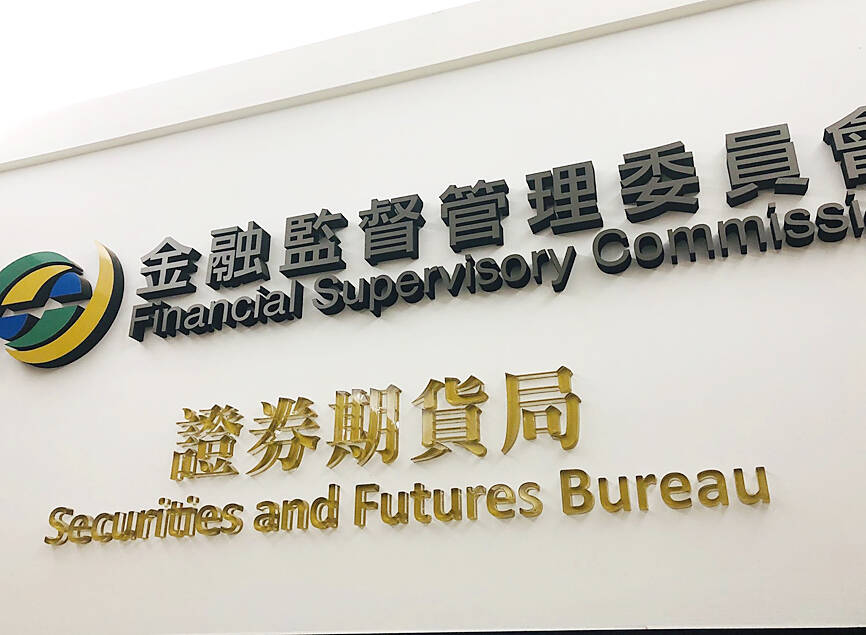The Financial Supervisory Commission (FSC) on Thursday said it would tighten regulation on securities investment consulting services using robot advisers, as it seeks to prevent manipulation and protect investors’ rights.
The commission said that it would talk with the Securities Investment Trust and Consulting Association to amend the Regulations Governing Securities Investment Consulting Enterprises (證券投資顧問事業管理規則).
The commission said it is planning to increase the maximum fine for malpractice at companies in the sector to NT$15 million (US$489,205) from NT$3.6 million.

Photo: Kelson Wang, Taipei Times
It said it would also launch a review of robot advisory algorithms to assess their investment terms, their ability to react to changes in the market and whether employees at the firms can manipulate the results.
Companies have so far been allowed to self-regulate their algorithms, but an expert panel would be set up to conduct reviews, it said.
As of the end of last month, robot advisers managed funds totaling NT$6.9 billion, up 42 percent from a year earlier, with 167,000 investors using the services, up 17 percent annually, Securities and Futures Bureau data showed.
Sixteen financial firms offered automated portfolio advisory, the data showed.
The top three service providers are Cathay United Bank (國泰世華銀行) with asset under management of NT$1.87 billion, First Commercial Bank (第一銀行) with NT$1.5 billion and Hua Nan Commercial Bank (華南銀行) with NT$700 million, the data showed.

Nvidia Corp chief executive officer Jensen Huang (黃仁勳) on Monday introduced the company’s latest supercomputer platform, featuring six new chips made by Taiwan Semiconductor Manufacturing Co (TSMC, 台積電), saying that it is now “in full production.” “If Vera Rubin is going to be in time for this year, it must be in production by now, and so, today I can tell you that Vera Rubin is in full production,” Huang said during his keynote speech at CES in Las Vegas. The rollout of six concurrent chips for Vera Rubin — the company’s next-generation artificial intelligence (AI) computing platform — marks a strategic

Enhanced tax credits that have helped reduce the cost of health insurance for the vast majority of US Affordable Care Act enrollees expired on Jan.1, cementing higher health costs for millions of Americans at the start of the new year. Democrats forced a 43-day US government shutdown over the issue. Moderate Republicans called for a solution to save their political aspirations this year. US President Donald Trump floated a way out, only to back off after conservative backlash. In the end, no one’s efforts were enough to save the subsidies before their expiration date. A US House of Representatives vote

REVENUE PERFORMANCE: Cloud and network products, and electronic components saw strong increases, while smart consumer electronics and computing products fell Hon Hai Precision Industry Co (鴻海精密) yesterday posted 26.51 percent quarterly growth in revenue for last quarter to NT$2.6 trillion (US$82.44 billion), the strongest on record for the period and above expectations, but the company forecast a slight revenue dip this quarter due to seasonal factors. On an annual basis, revenue last quarter grew 22.07 percent, the company said. Analysts on average estimated about NT$2.4 trillion increase. Hon Hai, which assembles servers for Nvidia Corp and iPhones for Apple Inc, is expanding its capacity in the US, adding artificial intelligence (AI) server production in Wisconsin and Texas, where it operates established campuses. This

US President Donald Trump on Friday blocked US photonics firm HieFo Corp’s US$3 million acquisition of assets in New Jersey-based aerospace and defense specialist Emcore Corp, citing national security and China-related concerns. In an order released by the White House, Trump said HieFo was “controlled by a citizen of the People’s Republic of China” and that its 2024 acquisition of Emcore’s businesses led the US president to believe that it might “take action that threatens to impair the national security of the United States.” The order did not name the person or detail Trump’s concerns. “The Transaction is hereby prohibited,”